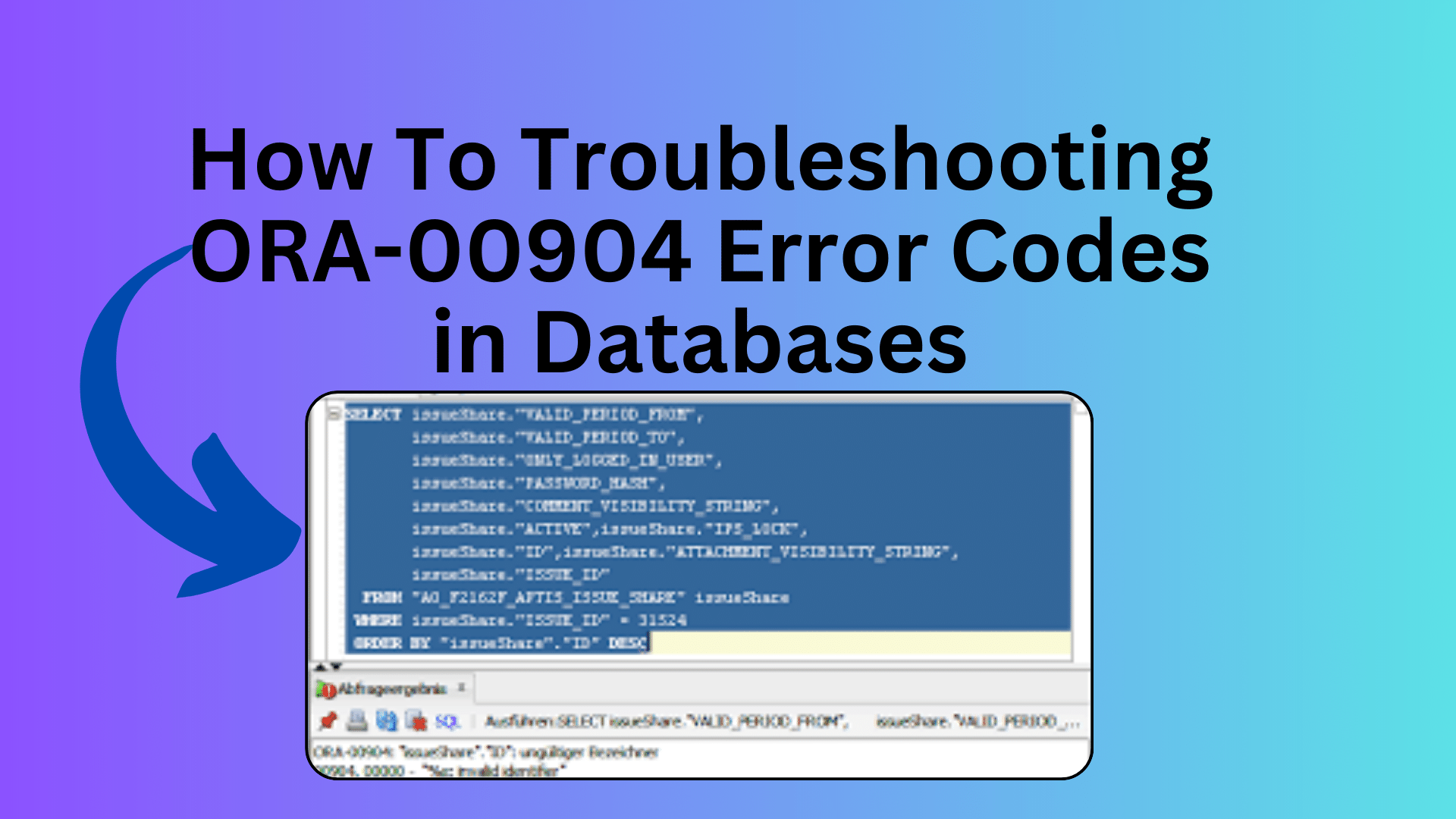
How To Troubleshooting ORA-00904 Error Codes in Databases
If you are new to Oracle databases and have encountered the mysterious ORA-00904 error, don’t worry; you’re not alone. Many beginners stumble upon this error, often when they start to write more complex SQL queries. In this blog post, we’ll dive deep into the ORA-00904 error, understand its implications, and most importantly, learn how to troubleshoot and fix it.
Understanding the ORA-00904 Error
The ORA-00904 error is Oracle’s way of telling you that it couldn’t recognize an identifier used in your SQL statement. An identifier can be a column name, a table name, or any other database object that you reference in your query. This error is frustrating, but it can be fixed with the right approach.
You Might Like This:
- How to Handle the /bin/sh: mysql_config Error During MySQL Setup
- Troubleshooting Xampp-mysql: Table Doesn’t Exist in Engine
- Understanding Collations: utf8mb4_unicode_520_ci
Common Scenario: Joining Tables
Let’s consider a common scenario that triggers the ORA-00904 error. You have two tables, table1 and table2. The primary key field ‘ID’ in table1 is a foreign key in table2. You’ve successfully executed a query like this:
select c.* from table1 c
inner join table2 c2 on c.ID = c2.RID
This query works as expected. However, the problem arises when you attempt to create a more complex query by adding additional tables, like table3 and table4, to your query:
select c.* from table1 c, table3 a, table4 b
inner join table2 c2 on c.ID = c2.RID
Suddenly, you’re faced with the dreaded ORA-00904 error: “C.ID: invalid identifier.”
Troubleshooting the ORA-00904 Error
To resolve the ORA-00904 error, you need to understand its root cause. In your case, the error message is telling you that “C.ID” is an invalid identifier. The error occurs because Oracle is unable to recognize the ‘ID’ column when you introduce the additional tables ‘table3’ and ‘table4’ in your query.
Here are the steps to troubleshoot and fix this error:
- Check Your SQL Syntax:Your SQL syntax should be correct. Oracle evaluates explicit join chains before comma-separated ones. In your original query, you correctly used explicit join syntax, but in the more complex query, you switched back to the older comma-separated syntax. Ensure that you consistently use explicit join syntax for all your joins.
- Verify Column Names:Double-check if ‘ID’ is the correct column name in ‘table1’. Typos or case sensitivity issues can lead to invalid identifiers. Ensure that the column name matches the one in your table’s schema.
- Understand Table Relationships:Make sure you have a clear understanding of the relationships between the tables you are joining. In your case, if ‘table3’ and ‘table4’ are being joined with ‘table1’, ensure that you have provided the necessary relations for these joins.
- Use Explicit Join Syntax:As mentioned earlier, it’s advisable to use explicit join syntax for all your joins. This not only prevents errors but also makes your SQL code more readable and maintainable.
Corrected Query:
select c.*
from table1 c
inner join table2 c2 on c.ID = c2.RID
inner join table3 a on [c.ID = a.RID] -- Provide the correct relations
inner join table4 b on [c.ID = b.RID] -- Provide the correct relations
Conclusion
The ORA-00904 error can be frustrating, especially for beginners in Oracle databases. However, by following the troubleshooting steps outlined in this blog post and ensuring proper SQL syntax and table relationships, you can overcome this error. Remember to use explicit join syntax consistently, and always double-check your column names to avoid invalid identifier issues.
By addressing the ORA-00904 error systematically, you’ll be well on your way to becoming more proficient in Oracle database management and SQL query writing. Happy coding!


[…] How To Troubleshooting ORA-00904 Error Codes in Databases […]